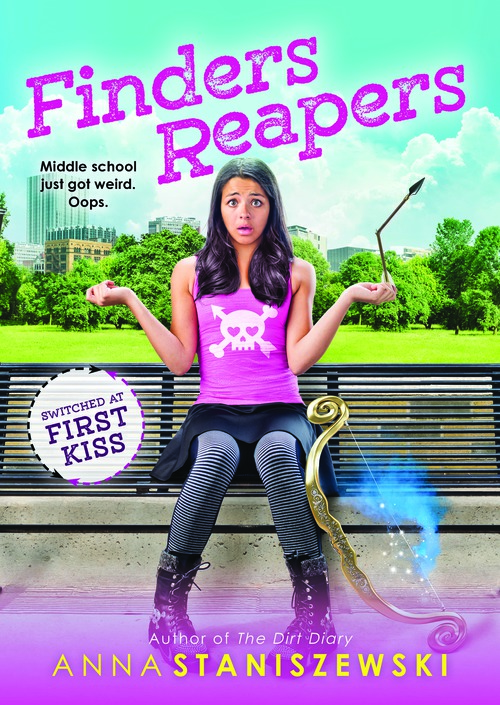Let’s be honest here: I’m turning into quite the Anna Staniszewski fan, what with my review of I’m With Cupid, The Gossip File, and The Prank List, and her two previous appearances on Sahar’s Blog, the first in the form of a guest post centered on The Gossip File and her first appearance in the Author Spotlight feature.
 I reached out to Anna again after reading her latest book, Finders Reapers, which continued the story of Marcus, who is a Cupid, and Lena, who is a Reaper, and their unusual yet surprisingly normal relationship. I was really impressed by the way Anna continues portraying the age group of her characters, be it Lena, Marcus, or the ones from her other series. And so, building on our previous exchange on Anna’s view of that particularly group as that of rational, intelligent, well-rounded individuals—which contrasts with the way society often sees them—I asked for her thoughts on romantic relationships amongst individuals of that age group and why she believes that, despite hiccups that even adults have, they can be drama-free (such a refreshing contrast to what we see in most media!)
I reached out to Anna again after reading her latest book, Finders Reapers, which continued the story of Marcus, who is a Cupid, and Lena, who is a Reaper, and their unusual yet surprisingly normal relationship. I was really impressed by the way Anna continues portraying the age group of her characters, be it Lena, Marcus, or the ones from her other series. And so, building on our previous exchange on Anna’s view of that particularly group as that of rational, intelligent, well-rounded individuals—which contrasts with the way society often sees them—I asked for her thoughts on romantic relationships amongst individuals of that age group and why she believes that, despite hiccups that even adults have, they can be drama-free (such a refreshing contrast to what we see in most media!)
Seriously, guys—Lena and Marcus have a credible, relatively drama-free hiccup in their relationship navigated by an author who focused on balancing out the lack of experience of their age group with their capacity to be rational and intelligent.
In Writing about Relatively Drama-Free Romance in Relationships between Pre-Teens, by Anna Staniszewski
Romantic relationships certainly do have drama—that’s probably unavoidable at any age—but I try to put aside societal expectations and follow my characters’ lead instead. I’ve found the best way to avoid stereotypical drama is to make into characters’ unique people and to trust that they’ll show me how their stories should play out.
 In Finders Reapers (the second book in the Switched at First Kiss series) Lena is a logical, no-nonsense person. She likes to control things and avoids taking risks. Unfortunately, relationships are full of risks, so she needs break through some of her trust issues if she’s going to figure out how to make things with Marcus work. Since Lena is not only an eighth grade girl but also a soul collector (like a grim reaper but without the hood and pointy thing) she has to deal with all sorts of problems, but resolving those problems ultimately has to stay in line with her personality and her emotional truths.
In Finders Reapers (the second book in the Switched at First Kiss series) Lena is a logical, no-nonsense person. She likes to control things and avoids taking risks. Unfortunately, relationships are full of risks, so she needs break through some of her trust issues if she’s going to figure out how to make things with Marcus work. Since Lena is not only an eighth grade girl but also a soul collector (like a grim reaper but without the hood and pointy thing) she has to deal with all sorts of problems, but resolving those problems ultimately has to stay in line with her personality and her emotional truths.
The same holds true for Marcus who’s the sweet romantic type (and a supernatural matchmaker—like Cupid but without the diaper). He’s someone who would bring a girl flowers to smooth things over and stress about making every date perfect. When problems arise, his first instinct isn’t to give up. Instead, he keeps working at making things right because that’s what the people in his life—especially his grandparents—have modeled for him.
Lena and Marcus might not have a typical drama-filled relationship the way we’d see on TV because they deal with the situation in their own way. Just like in real life, people have different approaches to conflict—my husband and I, for example, both instinctively avoid conflict, so we have to be mindful of talking through issues before they become real problems—and that’s what I strive for in my books. I want to create conflict that keeps readers engaged but not at the cost of forcing characters out of what’s realistic for them.
Just like there are many kinds of young people, there are many kinds of characters. They might all feel things deeply, but they express those feelings in unique ways. That’s what makes writing about them so interesting to me, and that’s why I continue to write stories about and for this age group.


